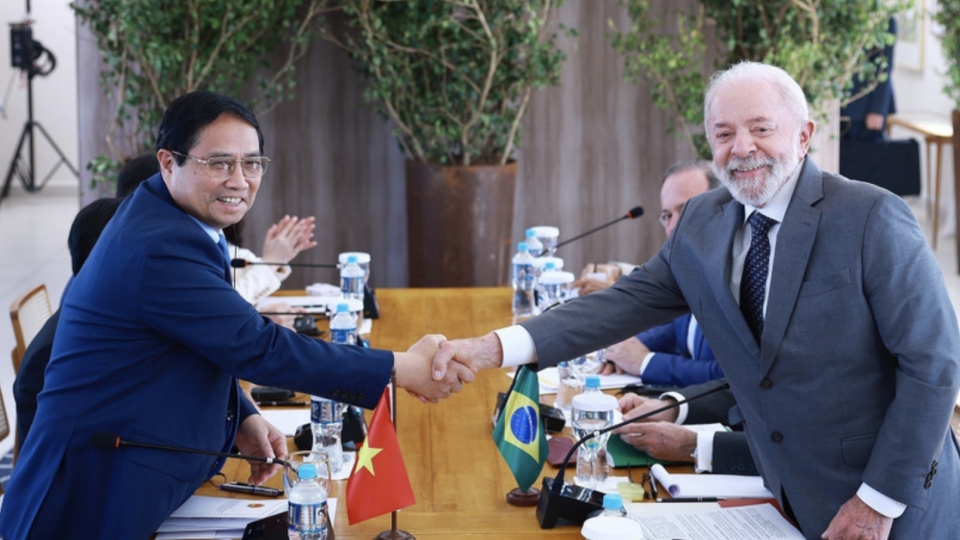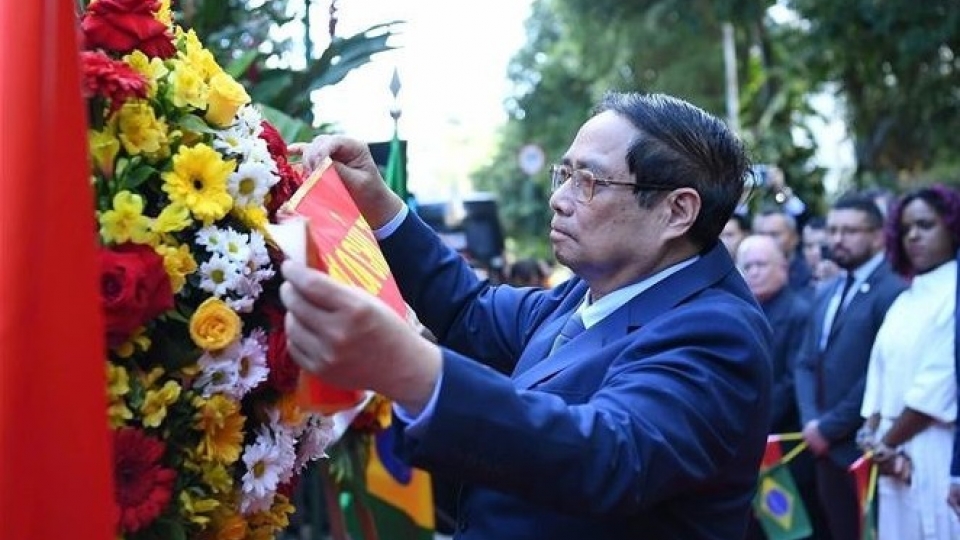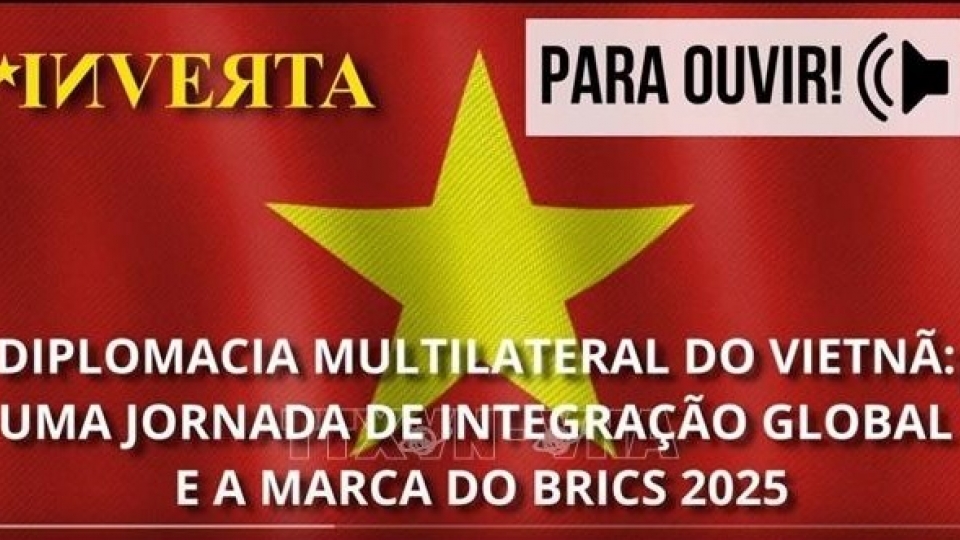Vietnam ready to facilitate long-term investment ties with Brazil
VOV.VN - The Vietnamese Government is ready to create all favorable conditions for Brazilian investors to pursue successful, sustainable, and long-term investment in Vietnam.
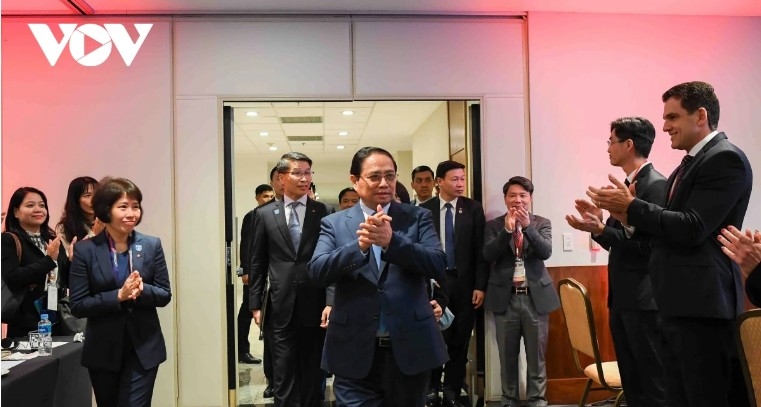
Prime Minister Pham Minh Chinh made the statement at the Vietnam–Brazil business forum held on the afternoon of July 5 (local time) in Rio de Janeiro, which featured the participation of
leaders from ministries, sectors, and organizations, along with more than 80 delegates representing major corporations and businesses from both countries.
Built on the solid foundation of the Vietnam–Brazil Strategic Partnership, economic ties have remained a key pillar of the bilateral relationship.
At present, Brazil is Vietnam’s largest trading partner in Latin America, with two-way trade posting impressive annual growth. Last year, bilateral trade reached nearly US$8 billion.
Vietnam’s major exports to Brazil include phones and phone components, computers, electronic products and components, machinery and equipment, transport vehicles and parts, and various types of steel and iron.
Vietnam mainly imports from Brazil ores and other minerals, various types of cotton, animal feed and raw materials, soybeans, corn, timber and wood products, as well as textile and footwear materials.
In terms of investment, Brazil currently has six projects in Vietnam with total registered capital of US$3.83 million, while Vietnam has one project worth US$300,000. in Brazil. The two countries are working toward raising two-way trade to US$10 billion in the near future, and to US$15 billion by 2030.
Following a presentation on Vietnam’s investment environment, participants at the forum agreed that there remains substantial room for economic cooperation between the two countries, which has yet to match their potential or the level of political and diplomatic relations, especially since the two sides upgraded ties to a Strategic Partnership in November 2024.
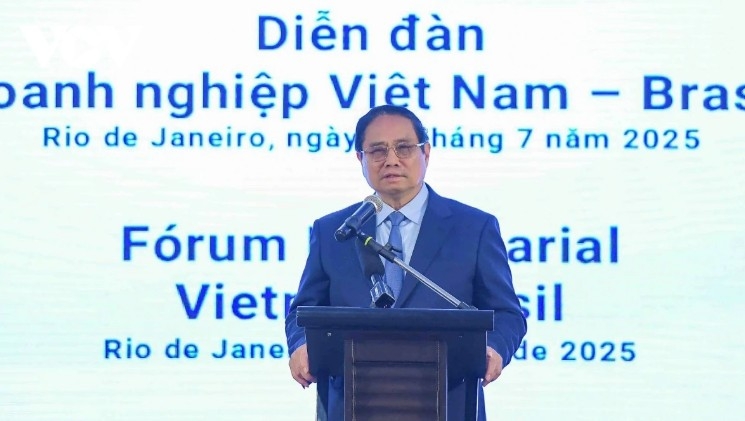
Representatives of the two countries’ business communities shared their respective strengths, potential, and investment interests, while also proposing measures to enhance bilateral cooperation, particularly in areas where one side has advantages and the other has demand, such as aviation, heavy industry, metallurgy, energy, telecommunications and technology, food, and agriculture.
In his speech, Prime Minister Pham Minh Chinh stressed that in a fast-changing world filled with both opportunities and growing challenges, countries must strengthen solidarity, uphold multilateralism, promote free trade and science and technology, and avoid politicizing trade, in order to tackle global issues that no single country can resolve on its own.
He noted that after many years of development, Vietnam–Brazil bilateral relations have continued to grow and are now at their best stage yet.
He stressed the need to preserve, consolidate, and further boost these ties in a way that is increasingly sound, stable, sustainable, and long-term, guided by far-sighted vision, strategic thinking, and ambitious action, contributing to peace, stability, cooperation, and development in the region and around the world.
Sharing Vietnam’s vision and actions toward realizing its national development goals for 2030 and 2045, the Vietnamese Government leader stated that Vietnam sees stability as a foundation for development, and development as a means to create further stability. The country pursues no other goal than to firmly safeguard its independence, sovereignty, unity, and territorial integrity, while constantly improving the material and spiritual well-being of its people.
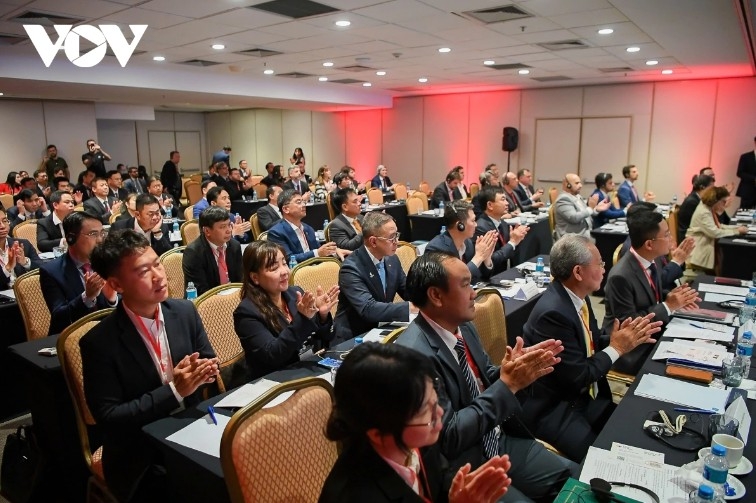
In recent years, Vietnam has emerged as a bright spot in terms of growth, regionally and globally. GDP has risen quarter by quarter, with growth in the first half of 2025 reaching the highest level for the same period in nearly two decades, placing the nation among the world’s top-performing economies.
Vietnam has maintained macroeconomic stability, with inflation controlled and major economic balances ensured.
Vietnam is currently pressing ahead with a wide range of new and decisive tasks, including several with historic and transformative significance. These include efforts to streamline the organizational apparatus, restructure and reorganize administrative units, and roll out the two-tier local government model; vigorously implement the “four-pillar framework” in accordance with the Politburo’s Resolutions; and draft additional resolutions on health, education, and culture, paving the way for the country to enter a new era of development, PM Chinh affirmed.
Briefing the forum on the successful outcome of his talks with Brazilian President Lula, PM Chinh recalled the President’s remark that both sides would strive to do their utmost, as the two economies clearly complement each other. This is reflected in the idea that “what Brazil lacks, Vietnam has the potential for; and what Brazil is strong in, Vietnam needs.”
For instance, both countries boast a rich variety of fruits, but their harvest seasons are different.
Noting that both countries hold important positions and roles in South America and Southeast Asia, the Vietnamese cabinet leader expressed his hope that Vietnam and Brazil will continue to serve as bridges between these two dynamic regions, which share great potential and comparative advantages.
Building on their sound political and diplomatic ties and shared core values, and in the spirit of “harmonized interests and shared risks,” he called on businesses from both sides to step up connectivity, cooperation, and investment, and to translate the two countries’ high-level agreements into concrete action.
Specifically, the two sides are advancing cooperation in three key and breakthrough areas: agriculture; science, technology, innovation, digital transformation, and telecommunications; and mineral extraction and processing, including copper, oil and gas.
In parallel, both countries are working to further open their markets to each other’s agricultural strengths. The PM noted that during this visit, Brazil exported its first shipment of beef to Vietnam, while Vietnam exported shipments of pangasius, basa, and tilapia to Brazil.
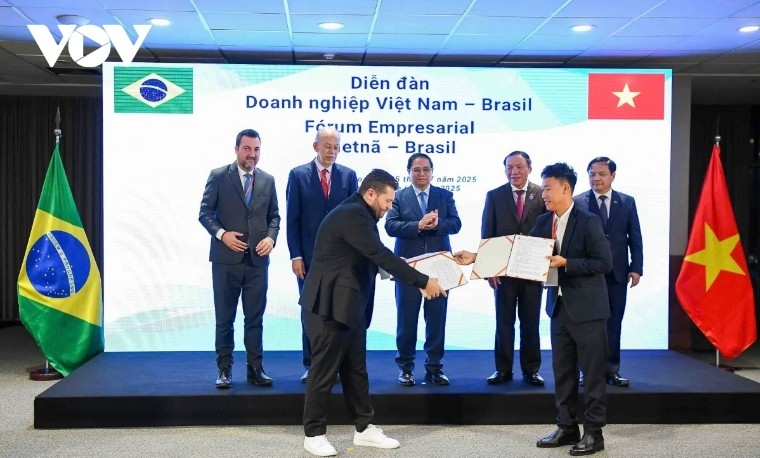
Brazil affirmed its willingness to increase imports of Vietnamese seafood and rice. The two sides also consented to sign an agreement to ensure stable and long-term food security for Brazil, under which Vietnam will supply rice to help the country maintain food stability.
Notably, as the world’s top two coffee producers, Brazil and Vietnam concurred to augment cooperation in the coffee sector by promoting the formation of a coffee production and export alliance, exploring the establishment of a coffee exchange, developing a joint coffee brand, and elevating coffee appreciation as a cultural link between the two nations.
Both sides also agreed to expand a new area of cooperation by investing in local production and deep processing of agricultural products to serve both domestic markets and export to third countries. This way would leverage each country’s strengths, optimize costs, and harmonize mutual interests.
For example, Vietnamese enterprises could grow rice and process it directly in Brazil, while Brazilian businesses could raise livestock and process meat in Vietnam, PM Chinh went on.
They reached a consensus on concluding negotiations on the Free Trade Agreement between Vietnam and the Southern Common Market (MERCOSUR) in the second half of 2025, and on accelerating progress toward an FTA between Vietnam and Brazil, thereby supporting each other amid current global challenges.
At the same time, they pledged to improve the legal framework for investment and labor cooperation, facilitate visa procedures, and expand direct flight routes as a mean of further strengthening business ties.
PM Chinh called on businesses to help turn the strong political and diplomatic foundation between Vietnam and Brazil into concrete economic outcomes, through business linkages, economic partnerships, and deeper connectivity between the two economies.
He expressed hope that friendship, solidarity, and sincerity will be reflected in real products and measurable results that bring practical benefits to both countries.
Immediately after the forum, in the presence of Prime Minister Pham Minh Chinh and leaders of ministries and agencies from both countries, Vietnamese and Brazilian enterprises exchanged several cooperation documents. These included an agreement on the farming and export of pangasius and tilapia between Nam Viet Corporation (Vietnam) and AV09 Import–Trade Company (Brazil); a quail farming agreement worth US$200 million between Trong Khoi One Member Limited Liability Company (Vietnam) and Fujikura Quail Genetics (Brazil); and an agreement on youth football training valued at US$3 million between Ho Chi Minh City Football Club and Gremio Football Club of Brazil.


